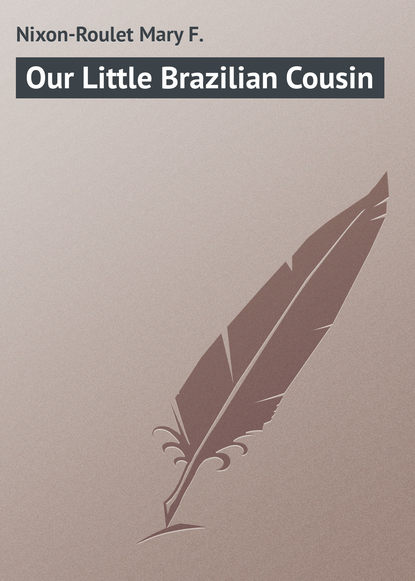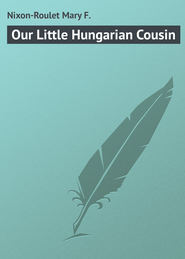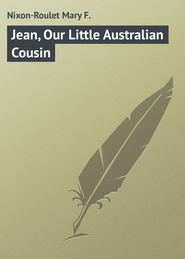По всем вопросам обращайтесь на: info@litportal.ru
(©) 2003-2024.
✖
Our Little Brazilian Cousin
Настройки чтения
Размер шрифта
Высота строк
Поля
"That is a relic of Dutch days in Brazil," said the Senhor. "You know the Dutch once laid claim to all this part of the country."
"Did they?" asked Lola in surprise. "How did they get here and what became of them?"
"It is a long story, little one, but quite an interesting one," said her father. "You know Brazil was discovered by a Portuguese, Pedro Alvarez Cabral, who sailed into the Bay of Porto Seguro at Bahia, April 25, 1500, and took possession of the land in the name of the Portuguese crown, naming it Vera Cruz. The Spaniards had made discoveries in the north of South America, the English and French had come in along the Amazon and within the next few years the Dutch entered the river and built forts on the Xingu. Then came a long struggle between the Dutch and the Portuguese as to who should possess the land. In 1624, a Dutch admiral took possession of Bahia, but a handful of Portuguese recaptured the place the next year; then came a succession of battles, first the Dutch being victorious, then the Portuguese. At last the Dutch sent Prince Maurice of Nassau as Governor General of their possessions in Brazil, but he returned to Holland in 1644 and from that time on the Portuguese were successful. They laid siege to Pernambuco (then called Recife) and blockaded the port with sea forces while the land army assaulted it on the other side. The Dutch surrendered in 1654 and Brazil became a Portuguese colony."
"Then I suppose everything was peaceful," said Affonzo, but his father laughed and said,
"There has not been much peace in Brazil since the Portuguese first discovered it. After the foreigners left, the Indians remained unconquered, and the Portuguese sent many expeditions against the natives in the interior. Many adventurers went on these expeditions, and they were called Bandierantes.[9 - Flag bearers.] They treated the Indians cruelly and enslaved many, although the Pope had forbidden making slaves of the Indians.
"Another fight which took place near here was with negro slaves. Some of them escaped and fled to the forest of Palmeiras, in the Province of Alagoas. Here they maintained a colony for sixty years and were only subdued in 1697. Some of their chiefs leaped from a high rock into the sea rather than be captured."
"How did they get slaves in our country?" asked Lola.
"That's a rather big subject for such a little girl," said her father. "The early settlers could not get any one to work for them, so they brought black people from Africa, as did most of the Southern countries. One good thing was that here slavery was abolished without a drop of blood being shed, while in North America they had a terrible war.
"Now we are entering the harbour, Affonzo. See how many ships! In one year there were one thousand one hundred and eighty-one ships here! They come from all parts of the world, laden with all manner of things, but they nearly all go away freighted with sugar. There are thousands of tons of it exported every year. The boat will stop here some hours, so we will go ashore and drive about the city."
"Oh, thank you, papa," cried the children, and their mother added, "It will be a pleasant change from the ship."
So the four went ashore and drove about the cheerful city, with its gaily painted houses, passing one public building glazed in yellow and green tiles, another in imitation pink marble trimmed in sky blue. Crossing a long bridge, they saw magnificent gardens with brilliant flowering plants, and the fine fruit-market where they purchased the luscious Pernambuco abacoxi the finest-flavoured pineapple in the world.
"It is a very fine city," said Affonzo as they returned to the steamer.
"But not as handsome as Para," said Lola. "That's the prettiest city in all Brazil," and her father laughed.
When they steamed into Bahia two days later just at twilight, she still insisted that Para was the most beautiful place in the world, but Affonzo was delighted with Bahia.
"Capt. Diego Alvarez was one of the early explorers here," said the Senhor, as they sat upon the deck in the moonlight, watching the crescent of lights which rise from the harbour toward heaven, for the main portion of Bahia is built upon a high bluff overlooking the river.
"He was captured by the Indians and was about to be killed, when the chief's daughter threw herself in front of him and saved his life. Alvarez fell in love with her and married her, taking her with him to France, where she was honoured and cared for all her life. Some of the best families in Bahia boast that she is their ancestor."
"What are sent out from here?" asked Affonzo.
"Thousands and thousands of cocoanuts, for one thing," said the Senhor. "It is a fortune for a family to have a cocoa plantation, for the trees produce from fifty to eighty years, and need little attention after the first year or two. They are very easy to raise. After planting, the weeds are kept away from the trees, and during the first year, banana plants are grown between the rows to shade the young trees. The fourth year the first crop is gathered and the trees produce two hundred clusters of fruit with thirty or forty nuts each. People net about sixty thousand dollars a year from a plantation of fifty thousand trees."
"It must pay to raise cocoanuts at that rate," said Affonzo. "Does manaioca pay as well?"
"Not quite, but it is about as easy to raise. Everyone has to have manaioca. The rich use if for puddings and desserts in the form of tapioca, while the poor people use the fariulia de manaioca[10 - Tapioca meal.] as their chief food. It also makes good starch, for the roots ground up in water deposit their starch as a fine white powder.
"A farm of twelve acres belonging to a friend of mine and planted with forty thousand plants produces eighty thousand pounds of tapioca, which at the lowest price brings two thousand four hundred and twenty-five dollars."
"The children are growing to be regular little encyclopedias," said the Senhora. "They must go to bed now, or I am afraid their brains will burst with so much knowledge."
"Not much danger of that," laughed the Senhor. "Most of it goes in at one ear and comes out the other," but Lola and Affonzo exclaimed indignantly, "Oh, no, papa, indeed it does not."
CHAPTER VII
IN THE CAPITAL
A week after they had left home, the children saw for the first time the harbour of Rio de Janeiro, the Icamiaba entering the beautiful bay between the Sugar Loaf Mountain and the Fortress of Santa Cruz, in all the glory of a Brazilian sunset.
At the left was the curious mountain called Seria dos Orgaos, so named from its resemblance to a church organ. Charming islets dotted the bay, and orange trees, bananas, always green and loaded with fruit, and flowers everywhere met the eye.
Mountains seemed to rise from the sea; the cliffs are nearly perpendicular with scarce a yard of greensward at the water's edge, and they guard jealously the most beautiful harbour in the world. Scarcely two ships can enter between the islands marking the entrance of the bay, which is so narrow that the discoverer thought it a river and named it "Rio." Within, however, the sheet of water widens until it is a glorious inner sea, called by the Indians, "Nictheroy" – Hidden Waters.
The houses of the city, walled in stucco, are of a deep canary yellow with roofs tiled in deep red, turning to fire beneath the sun's departing rays.
"How beautiful it is," said the Senhora. "It seems to me my old home never looked so fair!"
"It is one of the most beautiful places in the world," said her husband. "See those large buildings, children. That is the Sailors' Hospital on Ilha da Governador,[11 - Governor's Island.] which was once used as a hunting preserve by the royal family. It is a beautiful island and many strange things have happened there. One was the death of the founder of the city, Estacio de Sa. He was a famous Indian fighter, and here received a fatal wound from an arrow."
"Something seems to have happened everywhere in Brazil," said Lola. "How near we are to land."
"Yes," cried her mother. "And there is your uncle waving his hat upon the wharf. Martim is with him! He sees us! Wave to him, daughter!" and the usually calm Senhora, flushed and excited, waved her handkerchief, smiling happily.
"I have not seen you look so gay for many months," said her husband, and she replied, "It is so long since I have seen my dear old home and my own people!"
Soon the ship was made fast, and the children stepped off the gang plank to be greeted warmly by the uncle whom they had not seen since Lola was a baby, and the cousin whom they had never seen before.
"Your Aunt Luiza and Maria are anxiously awaiting you at home," he said. "Here is the carriage, so we will hasten."
"Drive through the Street do Ouvidor, papa, will you not?" asked Martim. "It is so gay with the French shops, my cousins will enjoy it."
Martim was a handsome boy of twelve, with a bright, pleasant face, an only child, for the Senhor and Senhora Lopez had lost all their other children in an epidemic of yellow fever some years before.
"What are those men doing with long poles over their shoulders," asked Lola, pointing to several men who carried bamboo rods with baskets hung at the ends.
"They are fish and vegetable vendors," Martim replied. "Some of those baskets weigh over a hundred pounds. Those other men with the gaily-painted tin trunks on their backs peddle clothing."
"They make a lot of noise," said Affonzo.
"Yes, they warn people they are coming by clapping together two pieces of wood fastened to their hands by a leather strap," said his cousin.
"Oh! What a beautiful statue!" cried Lola.
"That is the Emperor Dom Pedro I," said her uncle. "It was made by a noted French sculptor and represents the Emperor shouting the Brazilian watch word 'Independencia ou morte.'[12 - Independence or death.] Here we are at home!" as the carriage turned into a broad street on either side of which were old fashioned houses with broad verandas and red and white blinds. "There is Aunt Luiza waiting to welcome you!"
The children jumped out of the carriage and ran to meet their aunt, who kissed them warmly and drew forward a tall girl of ten, who looked pale and sad. Her hair was very light, her eyes deep blue, and she was a great contrast to black-eyed, brown-cheeked Lola.
"This is Maria, your North American cousin," said their aunt, and Lola kissed her warmly on either cheek.
"We are so glad to have you come," she said. "And my mother is going to take you home with us for a nice long visit. I have always wanted a sister, so let us play we are sisters."
Maria kissed her and smiled, while Aunt Luiza said, "Come, children, it is very late; dinner is waiting and then all you little folk must get to bed early so you will be ready for to-morrow. There are ever so many things for you to see."
Early next day the four cousins set out for a morning's sight-seeing, accompanied by their Uncle Hilario. The Senhor Lopez was one of those rare men who are really fond of children, and he enjoyed their society.
Most of the streets of the city have no curbing, and the children had to be careful lest they be run down by passing carriages.









